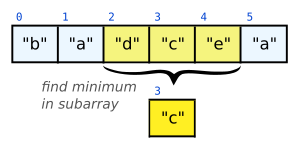Given a preprocessed array, a Range Minimum Query (RMQ) returns the minimum element in a chosen subarray:
This library provides various implementations with different trade-offs:
| Preprocessing and Memory | Query | ||
|---|---|---|---|
| Naive | O(1) |
O(N) |
No preprocessing |
| Dense | O(N²) |
O(1) |
Precompute all queries |
| Sparse | O(N logN) |
O(1) |
Precompute queries with a power-of-two length |
| Hybrid | O(N) |
O(1) |
Combine Dense and Sparse to shave a log! |
| Segment | O(N) |
O(logN) |
Binary partitioning of precomputed queries |
Since RMQ is a useful building block for more advanced algorithms, this package exposes a low-level interface returning the index of the minimum element: online documentation
let arr = [| "b" ; "a" ; "d" ; "c" ; "e" ; "a" |] (* given an array *)
let min_array = Rmq.of_array ( <= ) arr (* configure its [min] function *)
module Impl = Rmq.Hybrid (* choose an RMQ implementation *)
let t = Impl.preprocess min_array (* to precompute some answers *)
let found_index = Impl.minimum_index min_array t ~i:2 ~len:3 (* query range [2..4] for its minimum *)
let () = assert (arr.(found_index) = "c")As an example application, consider finding the Lowest Common Ancestor (LCA) between any two nodes in a tree:
- An array of nodes is obtained by an in-order traversal of the tree from left to right (in dashed red)
- The minimum element (by depth) between any two nodes in the array is their lowest common ancestor
When applied to a suffix tree, this yields a constant time "Longest Common Prefix (LCP)" between any substrings! (with linear preprocessing)


